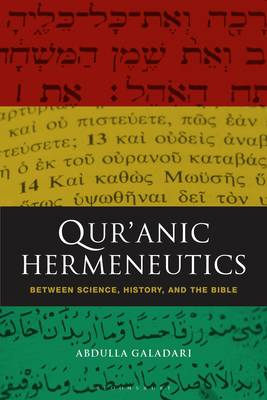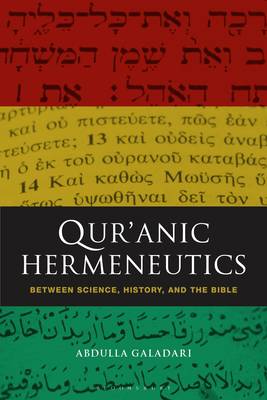
Bedankt voor het vertrouwen het afgelopen jaar! Om jou te bedanken bieden we GRATIS verzending (in België) aan op alles gedurende de hele maand januari.
- Afhalen na 1 uur in een winkel met voorraad
- In januari gratis thuislevering in België
- Ruim aanbod met 7 miljoen producten
Bedankt voor het vertrouwen het afgelopen jaar! Om jou te bedanken bieden we GRATIS verzending (in België) aan op alles gedurende de hele maand januari.
- Afhalen na 1 uur in een winkel met voorraad
- In januari gratis thuislevering in België
- Ruim aanbod met 7 miljoen producten
Zoeken
€ 76,45
+ 152 punten
Uitvoering
Omschrijving
This book is open access and available on www.bloomsburycollections.com.
Qur'anic Hermeneuticsargues for the importance of understanding the polysemous nature of the words in the Qur'an and outlines a new method of Qur'anic exegesis called intertextual polysemy. By interweaving science, history and religious studies, Abdulla Galadari introduces a linguistic approach which draws on neuropsychology.
This book features examples of intertextual polysemy within the Qur'an, as well as between the Qur'an and the Bible. It provides examples that intimately engage with Christological concepts of the Gospels, in addition to examples of allegorical interpretation through inner-Qur'anic allusions. Galadari reveals how new creative insights are possible, and argues that the Qur'an did not come to denounce the Gospel-which is one of the stumbling blocks between Islam and Christianity-but only to interpret it in its own words.
Qur'anic Hermeneuticsargues for the importance of understanding the polysemous nature of the words in the Qur'an and outlines a new method of Qur'anic exegesis called intertextual polysemy. By interweaving science, history and religious studies, Abdulla Galadari introduces a linguistic approach which draws on neuropsychology.
This book features examples of intertextual polysemy within the Qur'an, as well as between the Qur'an and the Bible. It provides examples that intimately engage with Christological concepts of the Gospels, in addition to examples of allegorical interpretation through inner-Qur'anic allusions. Galadari reveals how new creative insights are possible, and argues that the Qur'an did not come to denounce the Gospel-which is one of the stumbling blocks between Islam and Christianity-but only to interpret it in its own words.
Specificaties
Betrokkenen
- Auteur(s):
- Uitgeverij:
Inhoud
- Aantal bladzijden:
- 280
- Taal:
- Engels
- Reeks:
Eigenschappen
- Productcode (EAN):
- 9781350152106
- Verschijningsdatum:
- 20/02/2020
- Uitvoering:
- Paperback
- Formaat:
- Trade paperback (VS)
- Afmetingen:
- 156 mm x 234 mm
- Gewicht:
- 385 g

Alleen bij Standaard Boekhandel
+ 152 punten op je klantenkaart van Standaard Boekhandel
Beoordelingen
We publiceren alleen reviews die voldoen aan de voorwaarden voor reviews. Bekijk onze voorwaarden voor reviews.









